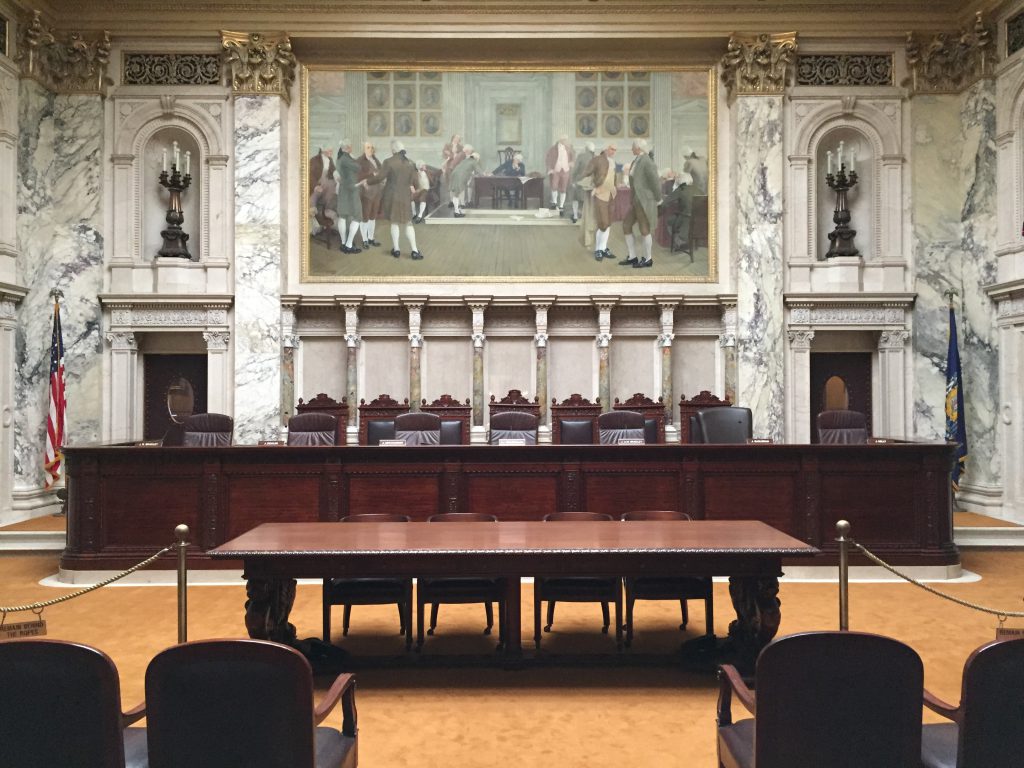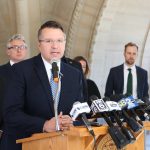Did High Court Ignore Their Rules on Election Case?
An attorney says the court didn't follow their normal rules for accepting briefs.
A lawyer is questioning the state Supreme Court’s consideration of briefs from three outside parties opposing Gov. Tony Evers’ executive order to postpone Tuesday’s election, while rejecting a motion to enter the case from voting rights groups he represents who favored the postponement.
The three briefs that the high court accepted before ruling 4-2 against the governor didn’t go through the court’s own procedure for such outside-party submissions, attorney Lester Pines wrote in a letter he sent Wednesday to Chief Justice Patience Roggensack.
Meanwhile, he stated, his own motion to enter the case on behalf of voting rights organizations that supported postponing the in-person Wisconsin vote Tuesday was rejected on the grounds it came too late. That was after Pines had followed the court’s established rule requiring outside parties to seek permission before filing motions to enter the case.
The letter doesn’t directly ask for a remedy, but appears to put the court on notice that it had not followed its own procedure — and might be expected to grant other parties the same leeway in the future.
The Legislature’s Republican leaders filed a petition Monday asking the high court to directly take their case to block Evers’ order to delay the election rather than go through a lower court at about 2:30 p.m., Pines told Roggensack, and the court set a 3:30 p.m. deadline for a response.
He emailed the clerk to let her know the voting rights coalition would file a motion to appear as a friend of the court, and submitted the motion at about 4:26 p.m. as an e-filing and by email about 21 minutes later.
“We filed the motion and proposed brief in compliance with Wis. Stat. § 809.19(7) which, as you know, governs the submission of non-party briefs to the Court,” Pines wrote. The statute lays out the procedure outside parties seeking to enter a case need to follow, including getting the court’s permission to do so.
Pines said the voting-rights lawyers have since learned “that three ‘letter briefs’ were filed with the Court in support of the Legislature’s position from the following: Attorney Richard Esenberg on behalf of the Wisconsin Institute for Law & Liberty; Attorney Lane E. Ruhland on behalf of the Republican Party of Wisconsin; and Attorney Andrew T. Phillips on behalf of the Wisconsin Counties Association/Washington County.”
Pines added: “It is also our understanding that the Court considered these ‘letter briefs’ despite the fact that none of the non-parties on whose behalf they were sent had asked the Court permission to file a non-party brief.”
In his letter, he asked Roggensack: “Has the Court adopted a new procedure that allows non-parties to present arguments to the Court by ‘letter briefs’ without first seeking permission to do so under Wis. Stat. § 809.19(7)?”
He then asked whether “in the future, may non-parties, on the basis of the Court’s consideration of ‘letter briefs’ in this matter, submit non-party ‘letter briefs’ to the Court with the understanding that the Court, on an ad hoc basis, will decide if it will review and consider them?”
His letter concludes: “The answer to those questions are important so that in the future attorneys who are consulting with potential amici to this Court can properly advise them about whether they should expend the time, effort and resources to comply with Wis. Stat. § 809.19(7) or just submit a ‘letter brief’ in the hope the Court will consider it.”
Reprinted with permission of Wisconsin Examiner.
More about the 2020 Spring Primary
- Why Don Natzke Couldn’t Vote - Enjoyiana Nururdin - Aug 9th, 2020
- Centers for Disease Control and Prevention’s Morbidity and Mortality Weekly Report highlights public health measures taken by the Milwaukee Health and Fire Departments, Department of Administration, Election Commission, and the Wisconsin Department of Health Services - City of Milwaukee Health Department - Aug 4th, 2020
- CDC Says Election Did Not Cause COVID-19 Spike - Erik Gunn - Aug 4th, 2020
- Pandemic Reduced Black Vote, Study Finds - Dee J. Hall - Jun 25th, 2020
- Did April Election Hike COVID-19 Cases? - Alana Watson - May 20th, 2020
- Elections Commission Notes ‘Lessons Learned’ - Henry Redman - May 19th, 2020
- Wisconsin Elections News: WEC Releases Analysis of Absentee Voting in April 7 Spring Election - Wisconsin Elections Commission - May 18th, 2020
- Election’s Impact on County’s COVID-19 Cases Unclear - Jeramey Jannene - May 6th, 2020
- Why State’s Voting By Mail Was Chaotic - Daniel C. Vock - May 4th, 2020
- At Least 40 COVID-19 Cases Tied to Election in Milwaukee - Graham Kilmer - Apr 24th, 2020
Read more about 2020 Spring Primary here























You have to agree this sounds like script for a Marx’s brother’s movie. However, in this case, we voted these clowns into the car.
I think we all know who is running this State these days….W.I.L.L.
Does anyone need more proof that our State Supreme Court is bought and paid for by corporate interests? The amici brief in support of postponement — a postponement strongly advised by public health officials — was not considered. It was not even treated in the same way as the briefs from the corporate donors of the 4 judges who voted against the postponement. This is quid pro quo. I get you elected and then when I ask you to rule in my favor, you do so even if it costs Wisconsin residents their lives. What’s more, Dan Kelly was allowed to express his opinion in spite of having to recuse himself.